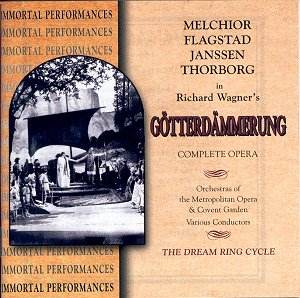Really serious collectors who are willing to buy many reissue
copies of different historical performances of a work will endlessly debate
which particular performance has the best moment of each particular artist’s
performance in each of the classic roles. But collectors like me who have
not the time, energy nor financial resources to explore to this degree
will be grateful to Richard Caniell and Guild for having spliced together
a "dream performance" from many sources. Not only that but they
have applied reasonable digital restoration which removes most of the
distracting noise but does not filter out any of the musical sound in
the vocal range. It is presented as part of the ‘The Dream Ring Cycle’.
The sources of these recordings are not the original
acetates but tape copies from the very late 1940s. The voices are clear
and the instruments well differentiated. The customary artefacts of
digital filtering are amazingly inaudible. We are told there are 512
splices in this recording made from many different sources, (in one
case 16 minutes of music took 43 hours of work to reconstruct) but I
never found any of them objectionable although on occasion I would be
aware of one here and there. Occasionally one wishes it were possible
to keep a little more of the orchestral bass than they have here. They
of course had to join sources of varying audio quality as seamlessly
as possible. This meant that, regrettably, the lowest quality source
would occasionally have to set the standard.
These disks are enjoyable and the spirit of the music
is genuinely evident. Listening for long periods of time to restricted
recordings generally makes me feel headachy and short of breath. For
this reason I generally have to break up my listening into half hour
sessions, but this recording grabbed me at once and I heard it straight
through. Flagstad sounds amazingly young throughout. Melchior in the
sunrise scene sounds nasal and wobbly. Gunther huffs and puffs and may
have been a fine stage actor, but what survives here is not distinguished.
Gutrune scoops into her notes, but Siegfried’s sight of "the first
woman he has ever seen (onstage, at least) who wasn’t his aunt"
must have been good for him, because Melchior abruptly sounds ten years
younger.
Hagen’s speech is appropriately menacing and must have
frightened the orchestra players as they struggle for a while. The audience
also comes down with a serious attack of morning bronchitis at sunrise.
In Scene 3 Flagstad is fabulous; the orchestra is inspired by her. Even
Gunther and Siegfried are feeling much better. In Act II Alberich is
terrific. Hagen and his henchmen are so convincing you want to jump
up and yell "rittorna vincitor!" The Act II finale is just
overwhelming, better than I’ve ever heard it (here Hagen is sung briefly
Ludwig Weber), and the audience applause shows they fully appreciated
what was before them.
In Act III Scene II the surface crackle on the source
materials is at times awful, and the worst splice in the whole recording
occurs. But Melchior seems to be yet another ten years younger and does
such a terrific job with his big scene you’re really sorry to see him
killed. I wished I were on stage so I could grab some spears and throw
one into the audience at the cougher in row C, and then one at the squirmy
occupant of that squeaky folding chair in the orchestra. In Flagstad’s
big finale scene the sound is at first disappointingly thinner than
previously. However it gets much better and she’s there and she does
it and it’s great.
This recording left me with a wonderful feeling: the
art of Flagstad is not gone from us. Here before us is her Götterdämmerung
in a form every opera lover can enjoy as well as appreciate and it will
now last forever. Melchior (after scene 1), Thorborg, Eduard Habich
as Alberich, and Dezso Ernster and Ludwig Weber as Hagen are also memorable.
With all the digital wonders available to restore historic
performances, the Nobel Prize remains to be won by the inventor of a
digital cough filter. Some bright child now among us will soar to riches
and glory with this accomplishment.
Paul Shoemaker
